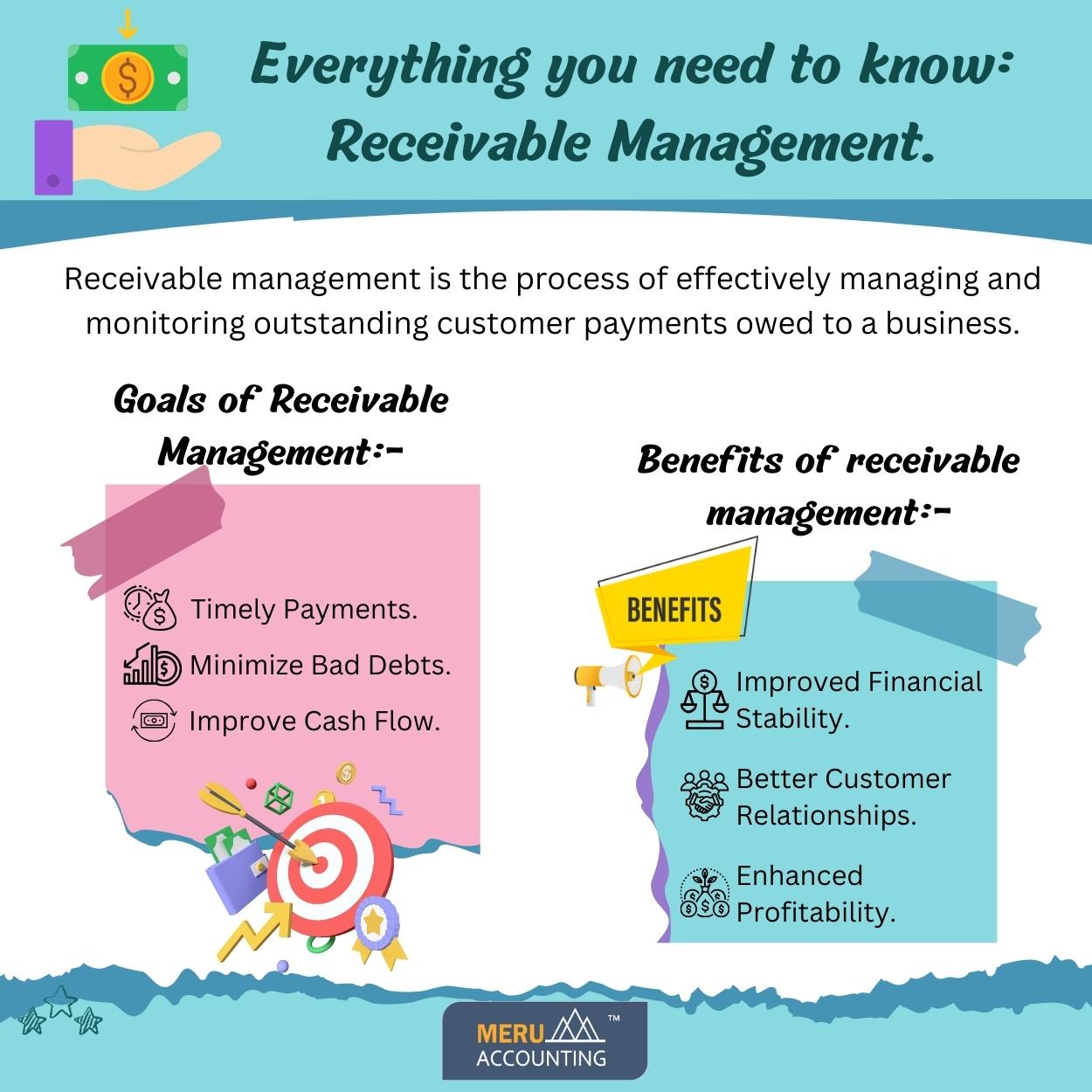- Schedule Meeting
Everything you need to know: Receivable Management.
Receivable management plays a crucial role in maintaining the financial health of a business. It involves effectively managing accounts receivable, which are the outstanding payments owed to a company by its customers.
In this article, we will explore the meaning, and goals of receivable management, the benefits of receivable management, tips for receivable management, and offer some useful tips for receivable management.
What is Receivable Management?
Receivable management is the process of effectively managing and monitoring outstanding customer payments owed to a business.
It involves maintaining accurate records, establishing credit terms, sending invoices, and ensuring timely payments. The goals of receivable management are to improve cash flow, minimize bad debts, and enhance financial stability.
By implementing clear credit terms, accurate invoicing, and regular follow-ups, businesses can optimize their receivable processes.
Timely payments not only improve cash flow but also contribute to better customer relationships. Receivable management is essential for maintaining a healthy financial position, enhancing profitability, and ensuring smooth business operations.
With proper receivable management practices in place, businesses can minimize payment delays, reduce financial losses, and foster positive customer interactions.
Goals of Receivable Management:-
Timely Payments:
The primary goal of receivable management is to ensure timely payments from customers. By implementing effective strategies, businesses aim to minimize payment delays and improve cash flow.
Minimize Bad Debts:
Receivable management also aims to minimize bad debts or uncollectible accounts. By conducting credit assessments and implementing credit control measures, businesses can reduce the risk of non-payment and financial losses.
Improve Cash Flow:
Efficient receivable management helps businesses maintain a healthy cash flow. By promptly collecting payments, businesses can have the necessary funds for operational expenses, investments, and growth opportunities.
Benefits of receivable management:-
Improved Financial Stability:
Effective receivable management contributes to improved financial stability. By ensuring timely payments, businesses can meet their financial obligations, manage expenses, and avoid cash flow problems.
Better Customer Relationships:
Receivable management involves regular communication with customers regarding their outstanding payments. By maintaining positive and transparent interactions, businesses can foster better relationships with their customers.
Enhanced Profitability:
By minimizing bad debts and improving cash flow, receivable management directly impacts profitability. Businesses can optimize their financial performance by collecting payments efficiently and reducing unnecessary financial losses.
Tips for receivable management:-
Clear Credit Terms and Policies:
Establishing clear credit terms and policies from the outset is crucial. This includes specifying payment due dates, late payment penalties, and credit limits. Clear terms help set expectations and reduce payment delays.
Timely and Accurate Invoicing:
Sending invoices promptly and ensuring accuracy is essential for effective receivable management. Invoices should clearly state the products or services provided, payment due dates, and payment instructions. This helps customers understand their obligations and facilitates timely payments.
Regular Follow-ups:
Regularly following up on outstanding payments is vital for receivable management. This can be done through email reminders, phone calls, or automated systems. Gentle reminders can help prompt customers to fulfill their payment obligations.
Establishing Relationships with Customers:
Building relationships with customers is crucial for successful receivable management. Maintaining open lines of communication and addressing any payment concerns promptly helps foster positive relationships and increases the likelihood of timely payments.
Utilize Receivable Management Tools:
There are various receivable management tools available that can simplify and streamline the process. These tools automate tasks such as invoice generation, payment reminders, and tracking overdue payments. Utilizing such tools can save time and improve efficiency.
Small and medium-sized businesses in the United States, United Kingdom, Australia, New Zealand, Hong Kong, Canada, and Europe can turn to Meru Accounting, a CPA firm, for full outsourced bookkeeping and accounting solutions with various managerial efficiency tasks.

We are a unique team of experts with specialization in MYOB, Xero Silver Champion & Advisors, and QB Pro Advisors.
- 3rd Floor 207 Regent Street, London, W1B 3HH.
- Phone: +44 (0) 203 868 2860
- [email protected]
TAX RETURN SERVICES
Join Our Newsletter Now
Be the First to Know. Sign up for our newsletter today.
© 2013-2025 Meru Accounting. All Rights Reserved.
Privacy Policy
We are a unique team of experts with specialization in MYOB, Xero Silver Champion & Advisors, and QB Pro Advisors.
- 3rd Floor 207 Regent Street, London, W1B 3HH.
- Phone: +44 73 6051 0348
- Email: [email protected]
Request Call Back

Meru Accounting
First Month Bookkeeping Free !
- Free Trial for First month Bookkeeping services worth $95
- Get Monthly Financial Statement( Click here )
- Dedicated Accountant with Backup person for each Business
- Latest Infrastructure with Great IT security
( Virtual Tour to our office )

Meru Accounting
First Month Bookkeeping Free !
- Free Trial for First month Bookkeeping services worth $95
- Get Monthly Financial Statement( Click here )
- Dedicated Accountant with Backup person for each Business
- Latest Infrastructure with Great IT security
( Virtual Tour to our office ) - Tax Filing Starting at just $350 ( Federal + 1 State )
( Check pricing for Business Owners)
Error: Contact form not found.
This will close in 0 seconds
Request Call Back OnClick

Meru Accounting
First Month Bookkeeping Free !
- Free Trial for First month Bookkeeping services worth $95
- Get Monthly Financial Statement( Click here )
- Dedicated Accountant with Backup person for each Business
- Latest Infrastructure with Great IT security
( Virtual Tour to our office )

Meru Accounting
First Month Bookkeeping Free !
- Free Trial for First month Bookkeeping services worth $95
- Get Monthly Financial Statement( Click here )
- Dedicated Accountant with Backup person for each Business
- Latest Infrastructure with Great IT security
( Virtual Tour to our office ) - Tax Filing Starting at just $350 ( Federal + 1 State )
( Check pricing for Business Owners)
Error: Contact form not found.
This will close in 0 seconds
Calendly
This will close in 0 seconds
office video
This will close in 0 seconds

